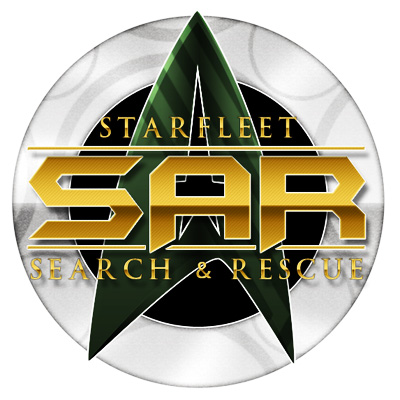Starfleet Search and Rescue: Difference between revisions
(adding some detail, re: SAR Team equipment) |
mNo edit summary |
||
| Line 1: | Line 1: | ||
{{UnderConstruction|Whale}} | {{UnderConstruction|Whale}} | ||
[[Image:Sb118SAR.jpg| | [[Image:Sb118SAR.jpg|right]] | ||
Revision as of 19:27, 1 June 2011
This notice was placed here by Whale, so go bug him to finish the page if nothing's happening.
Overview
Starfleet Search & Rescue is a sub-organisation of Starfleet that combines all active branches of the service, including marines. The organisation is managed through a number of autonomous operations centres, usually referred to as SAR Ops.
The various SAR Ops centres direct all search and rescue operations for their designated sector. For example, Starbase 94 SAR Ops coordinates missions for their area of space, while Deep Space 9 SAR Ops would coordinate for their area.
While there is no designated SAR starship, SAR Ops does have the ability to requisition Starfleet vessels and their crews to carry out their operations. In cases where a vessel has been temporarily assigned to a SAR Ops centre, a ranking member of that Ops centre is generally assigned to the vessel as a mission specilist to assist in the coordination of the mission. Frequently an entire SAR Team will also be assigned. All SAR Ops centres have various small craft at their disposal, such as runabouts, Mauls and Flamingoes, to assist in missions.
SAR Team Composition
SAR Teams do not generally have a standing roster -- meaning that it is very rare that an officer's sole responsibility would be to a SAR Team. Officers who serve on SAR Teams also have a primary responsibility, be it as an engineer on a starship, a doctor on a starbase, a pilot with a marine corps fighter wing. They are essentially on a stand-by roster and called the SAR Team duty as required.
Equipment
ISARAS
The Integrated Search and Rescue Armour System (ISARAS) is a modular armoured vest system based on the Crye and CIRAS systems of 21st century Earth, designed specifically for the varied duty requirements of the SAR Team. The vest itself provides superior protection from physical attack as well as substantial protection from most energy-based weapons fire.
The ISARAS can be fitted with numerous pouches and clips and customized to the individual wearer and their role on the SAR Team. For example, an engineer may have -- in addition to the phaser holster standard on all configurations -- a tricorder pouch and various tool and equipment pouches/clips, while a medical officer would carry advanced medkits, hyposprays, etc. A marine participant may have the majority of their ISARAS dedicated to carrying weaponry and explosives, depending on the role the individual has been asked to fill.

